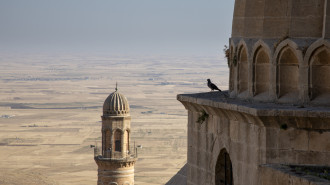60 migrants drown off Tunisia: Red Crescent
Survivors told the Red Crescent the tragedy unfolded after some 75 people who had left Zuwara on the northwestern Libyan coast late Thursday on a large boat were transferred to a smaller one that sank off Tunisia.
"The migrants were transferred into a smaller inflatable boat which was overloaded, and 10 minutes later it sank," Mongi Slim, a Red Crescent official in the southern Tunisian town of Zarzis, told AFP.
Tunisian fishermen rescued 16 people and brought them to shore in Zarzis.
The survivors said they spent eight hours trapped in the cold sea before they were spotted by the fishermen who alerted the Tunisian coastguard, Slim said.
The bodies of three people were plucked out of the waters on Friday, the Tunisian defence ministry said.
Survivors said the boat was heading to Italy and had on board only men, 51 from Bangladesh, as well as three Egyptians, several Moroccans, Chadians and other Africans.
Fourteen Bangladeshi nationals, including a minor, were among the survivors, said the Red Crescent.
"If the Tunisian fishermen hadn't seen them (migrants), there wouldn't have been any survivors and we would have never known about this" boat sinking, said Slim.
Charity ships have plied the Mediterranean Sea to rescue migrants in large numbers but the number of rescue operations have dwindled as these vessels have come under fire, namely from the populist Italian government, over their action.
Italy's far-right Interior Minister Matteo Salvini has imposed a "closed ports" policy, refusing to allow migrants rescued at sea to enter his country.
On Friday, however, more than 60 migrants disembarked in Italy after two boats which had left Libya faced difficulties at sea and needed assistance.
The UN agency for refugees UNHCR called for stepped up search and rescue operations to avoid future tragedies in the Mediterranean, which it calls the "world's deadliest sea crossing".
"Across the region we need to strengthen the capacity of search and rescue operations," said Vincent Cochetel, the agency's special envoy for the Mediterranean.
"If we don't act now, we're almost certain to see more tragic events in the coming weeks and months," he warned.
According to the UNHCR, the journey across the Mediterranean "is becoming increasingly fatal for those who risk it".
"In the first four months of this year, one person has died (crossing the Mediterranean) for every three that have reached European shores, after departing from Libya," it said.
In April, at least 97 people, including 15 women and five children, went missing after their Europe-bound boat sank off the Libyan coast.
General Ayoub Kassem said 23 people were rescued around 10 kilometres off the Libyan coast after authorities received a distress call. Fifteen women and five children were among those missing.
The boat's hull was completely destroyed and the survivors, all men, were found clinging to a floating device, he said.
Six years since a revolution that toppled dictator Muammar Gaddafi, Libya has become a key departure point for refugees risking their lives to cross the Mediterranean to Europe.
Hailing mainly from sub-Saharan countries, most of them board boats operated by people traffickers in the country's west, heading for the Italian island of Lampedusa 300 kilometres away.
Smugglers use often rickety vessels to ferry thousands of refugees from the North African country to Europe each month. Mass drownings are common when the overloaded boats capsize or sink.
The German government said it would support a ban on the export of boats from the European Union to Libya as part of measures to stem the flow of migrants across the Mediterranean.
Follow us on Twitter: @The_NewArab







 Follow the Middle East's top stories in English at The New Arab on Google News
Follow the Middle East's top stories in English at The New Arab on Google News
![Israel demolished homes in the Silwan area [Getty]](/sites/default/files/styles/image_330x185/public/2024-11/GettyImages-2183868368.jpg?h=199d8c1f&itok=TweR8vd0)

